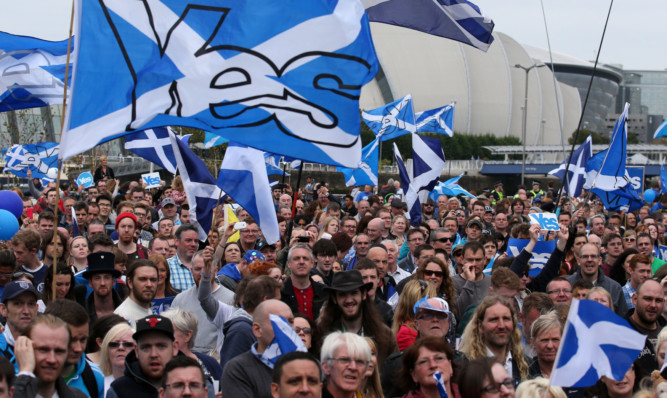Nick Robinson has compared protests against his coverage of the Scottish independence referendum to something out of Vladimir Putin’s Russia.
The outgoing BBC political editor hit out at “intimidation and bullying” of journalists during an appearance at the Edinburgh International Book Festival to promote his latest book Election Diary.
Mr Robinson, who is joining Radio 4’s Today programme, was accused of bias in the run-up to last year’s independence referendum after getting into a high-profile confrontation with former first minister Alex Salmond over the BBC’s coverage of a story about the possible relocation of RBS.
The spat at a press conference in Edinburgh resulted in hundreds of pro-independence supporters congregating outside the BBC’s Glasgow headquarters to call for his resignation in the days before the vote.
Mr Robinson admitted the episode was “a source of regret” but said: “Alex Salmond was using me to change the subject. Alex Salmond was using me as a symbol, a symbol of the wicked, metropolitan, Westminster classes sent from England, sent from London, in order to tell the Scots what they ought to do.
“As it happens I fell for it. I shouldn’t have had the row with him, which I did and I chose a particular phrase we might explore badly in terms of my reporting and that is genuinely a sense of regret.
“But as a serious thought I don’t think my offence was sufficient to justify 4,000 people marching on the BBC’s headquarters, so that young men and women who are new to journalism have, like they do in Putin’s Russia, to fight their way through crowds of protesters, frightened as to how they do their jobs.
“That, you may agree with me or disagree with me, is not how politics should operate either in the UK or in future independent Scotland if there is to be such a thing.
“We should not live with journalists who are intimidated, or bullied, or fearful in any way”.
Mr Robinson said he had taken several personal lessons from the episode but hit out at the antipathy towards journalists from outside Scotland covering the referendum.
He said: “There’s a deeper question around, should a man from London, should an Englishman come to Scotland to cover the referendum particularly at the last minute? To which my answer is an unequivocal yes.
“This country is still a United Kingdom until and unless the Scottish people vote for it not to be.
“The idea that before Scotland becomes independent, if she is ever to become independent, that only certain journalists can cover it, who live in certain places and come from certain locations is again dangerous.”
He said he was concerned about the growth of “echo chamber” politics and journalism perpetuated by social media.
“The great danger is that people only read and hear and watch … people they already agree with because you choose who to follow.
“And what I saw happen in the lead-up to the Scottish referendum was that the vortex of anger about my reporting on that one occasion was all connected with social media.
“This is very dangerous. We’ve seen what happens with Fox News in the United States people only watch media that they agree with.”
He added: “The big lesson I learned from that protest is that ain’t what a democratic politician should be about.”
Mr Robinson, who earlier this year had a successful operation to remove a lung tumour, said he was particularly delighted to attend the festival “as it means I’m on the road to recovery”.
